Wellington
The Thorndon School redevelopment was necessitated by both growth in the school’s roll and the removal of existing buildings with significant weathertightness issues.
The scope of the project included the development of 13 learning spaces and a new library and administration space. Located on a complex shaped, steep and very compact inner-city site the design response required that every square metre of the site became quality usable space developed to ensure an engaging, durable and accessible environment for Year 1-8 students.
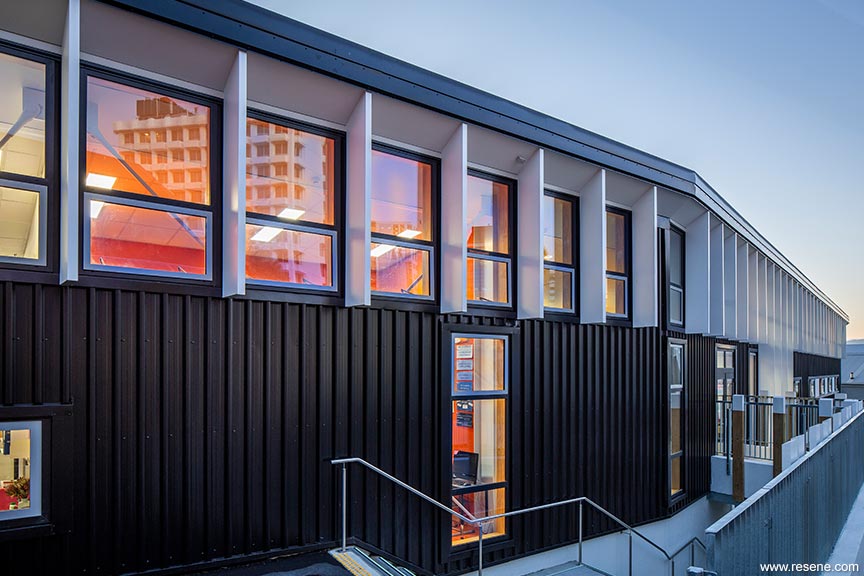
All spaces have a close relationship to the outdoors, to a range of characterful spaces both grassed and paved. These spaces respond directly to the adjacent learning space typologies so that, for example, the new entrant learning area opens on to a sheltered and sunny enclosed private courtyard featuring a large brightly coloured Andrew Steel mural.
The primary aim of McKenzie Higham’s education work is to deliver exceptional interior and exterior learning spaces, with a strong focus on each projects unique programmatic and pedagogical requirements. They design for an architecture that responds strongly to its context and consequently for unique, interesting and inspiring buildings for learners, educators and the general public alike.
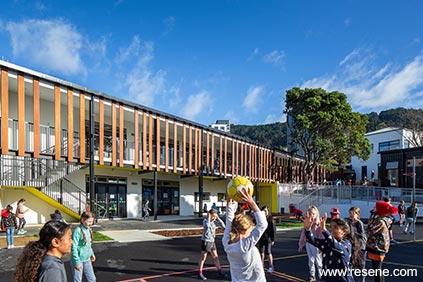
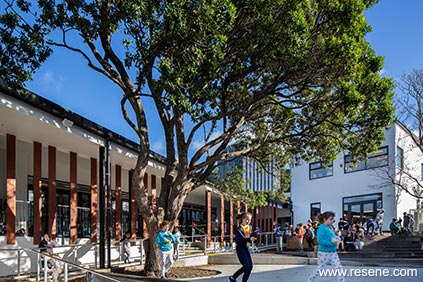
At Thorndon School, a simple exterior colour and materials palette belies a relatively complex form that shelters the school population within a central courtyard, while creating an identifiable presence in Thorndon’s varied built landscape. The resultant material palette is largely monochromatic, dark prefinished metal, and light painted fibre-cement. Balconies become part of the landscape, with timber slats, a natural material and finish that cleverly modulates the light and shadow to the broad balconies behind. These then become dappled, intriguing outdoor learning spaces in their own right.
The interiors of the four learning studios are purposeful in offering the range of spatial characteristics required by the educational imperatives, with calm flexible learning areas and vibrantly coloured perimeter specialist and breakout spaces that define their function.
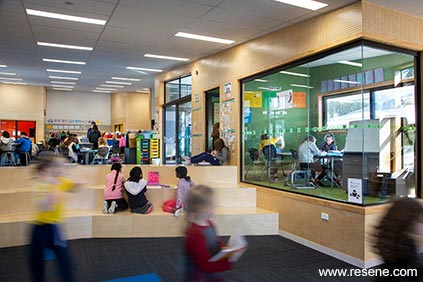
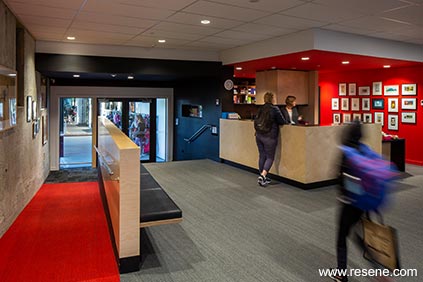
The administration area adopts a more sophisticated adult vibe in response to its urban street edge character and contrasts dramatically with the adjacent library and staffroom above. These spaces are housed in the only retained building, a concrete framed two storey rectilinear form (known as the ‘Whitehouse’ for its original and now reinstated exterior colour) where the exposed interior concrete walls have been sandblasted and clear finished revealing an intriguing patina, evidence of both its materiality and of the hewn quality of its construction.
A defining colour palette was desired for each of the four learning studios and for the administration block to establish a sense of identity and as a way-finding system for the younger students. Colour is reflected in all elements from carpet to joinery, right down to the toilet door finishes.
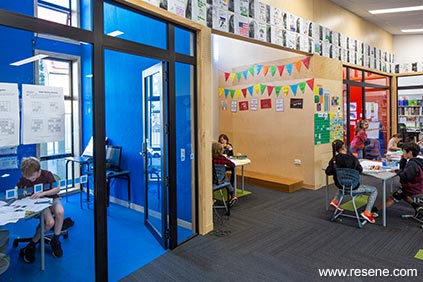
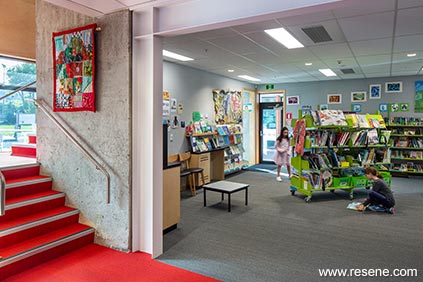
The design team started by choosing from the restrictive colour palettes of the non-paint interior selections before choosing Resene colours for the paint finishes. The broad range of colours available in the comprehensive Resene ranges make this a logical approach.
Red was chosen as the predominant marker for the administration block, affirming that the school has strong ties to the local iwi and a graphic demonstration of the importance of Tikanga Māori. Māori design elements are integrated into the administration area in large format glazing manifestations and in the primary entry signage to the School, a bold contemporary work specifically commissioned from Māori sculptor Rangi Kipa.
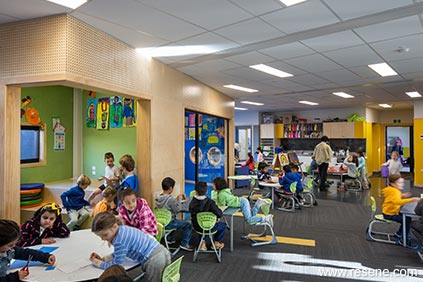
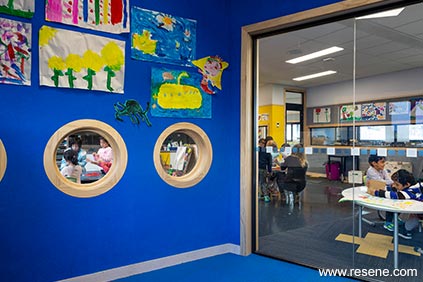
With prevailing bold interior colours, a neutral colour palette was an appropriate response for the exterior colours. A feature yellow soffit in Resene Sunflower was chosen for the downstairs studio to enliven the potentially dark link passageway under the building.
The exterior is finished in Resene X-200 weathertight membrane in Resene Sea Fog with a bold yellow feature in Resene Sonyx 101 in Resene Sunflower. For safety decking is finished in Resene Non-Skid Deck & Path in Resene Haast Shale and Resene Kowhai.
Resene House White meanders throughout the interior, mainly finished in Resene SpaceCote Low Sheen with Resene Uracryl 802 on exposed steel. It is joined by Resene Nero and Resene Roadster in the administration area, Resene Citron, Resene Tangerine, Resene Lochmara and Resene Turbo in the toilets, and connects through to Resene Citron and Resene Lochmara in the library. Plywood walls in Resene Aquaclear satin and interior timber trims in Resene Colorwood Whitewash.
Apart from the detached hall, the Whitehouse was the sole building which had to be retained and re-integrated into the new design. Like the Heritage New Zealand listed school hall, the Whitehouse was retained on site as a reminder of the school’s past, so there needed to be careful consideration as to how best to integrate and restore it for its contemporary use.
The Whitehouse’s concrete walls were most recently brightly coloured and covered in murals, although the name derives from its earlier and much more subdued presentation. The design team determined that internally exposing the material and construction would complement the new works and allow this building to stand as recognisably unique, so the façade was waterblasted to strip it back to a clean and timeless state. Resene Concrete Clear was chosen to seal the raw interior surface, making it a feature element of the administration and library area. Resene Rockcote Render helped refresh the tired exterior façade, and combined with the white Resene Sea Fog, has reinstated the ‘white house’.
Architectural specifier: McKenzie Higham Architects
Building contractor: Hawkins Construction
Client: Ministry of Education
Colour selection: McKenzie Higham Architects
Painting contractor: Metropolitan, Freear Philip
Photographer: Paul McCredie
Project: Resene Total Colour Awards 2019
Resene case studies/awards project gallery
View case studies that have used Resene products including many from our Resene Total Colour Awards. We hope these projects provide inspiration for decorating projects of your own... view projects
Total Colour Award winners:
2023 |
2022 |
2021 |
2020 |
2019 |
2018 |
2017 |
2016 |
2015 |
2014 |
2013 |
2012 |
2011 |
2010 |
Entry info
Latest projects | Project archive | Resene news archive | Colour chart archive